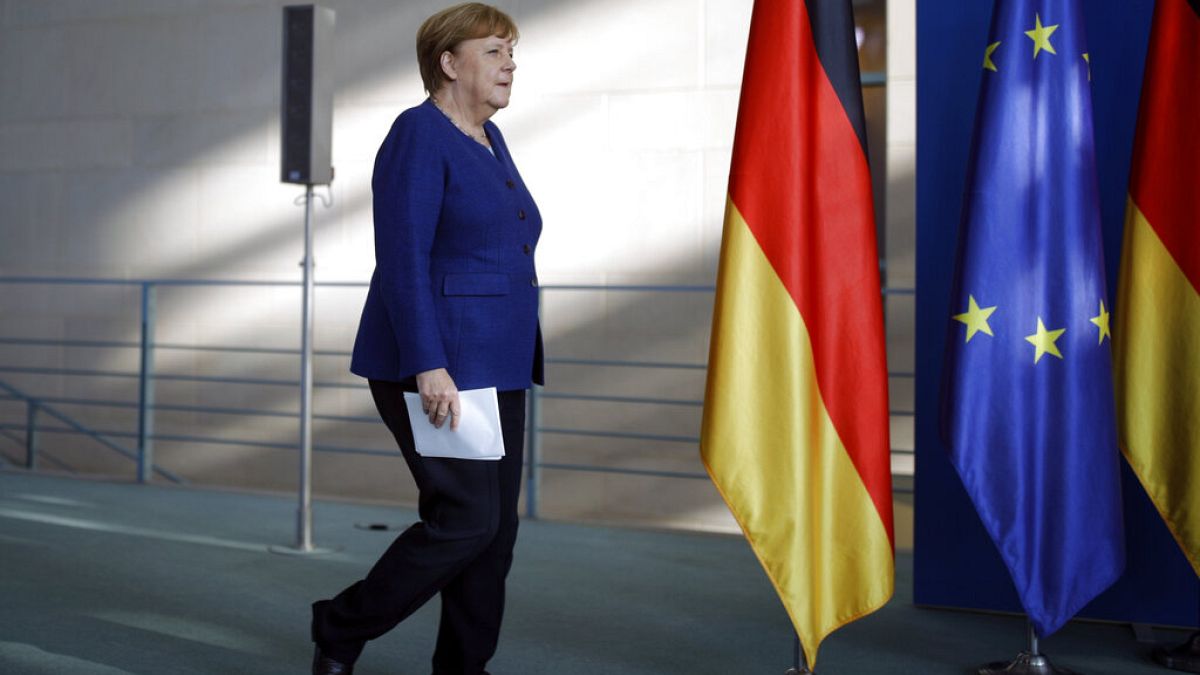As Germany prepares to take over the rotating EU presidency in a month’s time, how the bloc emerges from this latest crisis will be Merkel’s last big test, writes Euronews' political editor Darren McCaffrey.
At the start of this crisis, Angela Merkel claimed that the European Union was facing its biggest challenge since its foundation.
"Everyone has been hit equally by this and it must be in the interest of everyone, and of Germany, that Europe emerges stronger from this test,” she said at the start of April. "The answer can only be more Europe, a stronger Europe and a well-functioning Europe.”
As Germany prepares to take over the rotating EU presidency in a month’s time, how the bloc emerges from this latest crisis will be Merkel’s last big test. She has, of course, said that she won’t be contesting the next election, after more than 15 years in power.
The challenges and the tests of the six-month term are huge. First up, getting member states to sign up to the European Commission’s recovery fund. Announced on Wednesday by President Ursula von der Leyen, the ambitious plan comprises a total of €750 billion - with €500 billion made available to the member states in the form of grants and €250 billion in the form of low-cost loans. That is in addition to the EU’s 2021-27 budget, which leaders couldn’t agree on before the coronavirus crisis.
On the agenda
The official negotiations will be carried out by Charles Michel, president of the European Council, but Angela Merkel remains the most powerful leader on Zoom.
She has already proved crucial with her conversion to Brussels’ plan to raise and share debt - until recently a taboo in Berlin, even within her own Christian Democratic Union party. Discussions will be tough and deep divisions remain, with the Netherlands and Austria - the most vocal members of the Frugal Four - far from convinced. Europe literally can't afford not to have a deal.
The thorny issue of the rule of law has not gone away. If anything, recent decisions taken during the crisis by both Poland and Hungary appear to have made it even more pressing.
One Commission official has suggested Germany might use a report on the issue scheduled for September “to spark a genuine discussion on the subject in the Council".
Then, of course, there is Brexit - remember that? The EU and UK have a very tight timetable to reach an agreement before the transition period ends on 31 December. In fact, they are meant to have made significant progress by the end of June. Discussions are not going well and the prospect of reaching an agreement seems to be diminishing.
Foreign affairs
But it is in foreign affairs that Angela Merkel really wants to make her mark. Speaking from Berlin on Wednesday, she said the European Union should take more global responsibility in the coronavirus crisis, especially as ties with the United States were currently “difficult”.
“In many places, the pandemic will intensify existing conflicts and problems and will therefore also become a stress test for the European Union,” she said.
She called on the EU to speak up for the values of “democracy, freedom and the protection of human dignity.”
While it wouldn’t be a surprise to say the Chancellor would prefer a different occupant in the White House after the next election, it is relations with China that might prove most troublesome. Despite questions about China’s role in the origin of the pandemic and ongoing trouble in Hong Kong, Merkel insisted that the European Union has a “great strategic interest” in maintaining cooperation with Beijing.
“We Europeans will need to recognise the decisiveness with which China will claim a leading position in the existing structures of the international architecture,” Merkel said in a video speech to a think tank with ties to her CDU.
Defining a legacy
Any one of these challenges would test any leader. Facing them all at once would overwhelm most politicians. But Merkel is one of the world's most successful democratic leaders for a reason. This crisis has brought her some good news: the latest polling puts her approval rating at 68 per cent, far ahead of any other German politician, and her CDU party its CSU partners are on their highest polling in years at 39 per cent.
Angela Merkel has faced countless crises in her long-running chancellorship. The German presidency of the European Union will probably be her last - and one that could define her legacy. It is going to be an immense six months.
Darren McCaffrey is Euronews' political editor.
